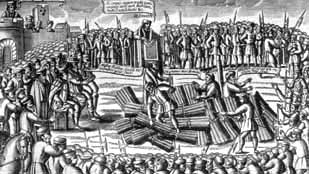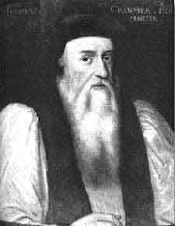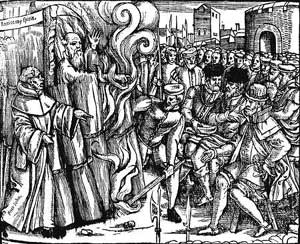Readings:
Zephaniah 3:1-5
Psalm 142
1 Corinthians 3:9-14
John 15:18-20Preface of a Saint (1)
[Common of a Martyr]
[Common of a Pastor]
[Of the Holy Cross]
[For the Ministry II]
PRAYER (contemporary language)
Lessons revised at General Convention 2024. Return to Lectionary
Home Page
Webmaster: Charles
Wohlers
Last updated: 17 August 2024
PRAYER (traditional language)
Keep us, O Lord, constant in faith and zealous in witness, that, like thy servants Hugh Latimer, Nicholas Ridley, and
Keep us, O Lord, constant in faith and zealous in witness, that, like your servants Hugh Latimer, Nicholas Ridley, and Thomas Cranmer we may live in your fear, die in your favor, and rest in your peace; for the sake of Jesus Christ your Son our Lord, who lives and reigns with you and the Holy Spirit, one God, now and for ever. Amen.
HUGH LATIMER
BISHOP AND MARTYR (16 OCTOBER 1555)
NICHOLAS RIDLEY
BISHOP AND MARTYR (16 OCTOBER 1555)
THOMAS CRANMER
ARCHBISHOP OF CANTERBURY AND MARTYR, 1556
When Henry the Eighth of England died, he left three heirs: his
son Edward and his two daughters, Mary and Elizabeth. Edward succeeded
to the throne and was a staunch Protestant (or at least his advisors were).
Under his rule, the church services, previously in Latin, were translated
into English, and other changes were made. When Edward died, the throne
passed to his sister Mary, who was firmly Roman Catholic in her beliefs.
She determined to return England to union with the Pope. With more diplomacy,
she might have succeeded. But she was headstrong and would take no advice.
Her mother had been Spanish, and she determined to marry the heir to the
throne of Spain, not realizing how much her people (of all religious persuasions)
feared that this would make England a province of the Spanish Empire. She
insisted that the best way to deal with heresy was to burn as many heretics
as possible. (It is worth noting that her husband was opposed to this.)
In the course of a five-year reign, she lost all the English holdings on
the continent of Europe, she lost the affection of her people, and she
lost any chance of a peaceful religious settlement in England. Of the nearly
three hundred persons burned by her orders, the most famous are the Oxford
Martyrs, commemorated today.
 Hugh
Latimer was famous as a preacher. He was Bishop of Worcester (pronounced
WOOS-ter) in the time of King Henry, but resigned in protest against the
King's refusal to allow the Protestant reforms that Latimer desired. Latimer's
sermons speak little of doctrine; he preferred to urge men to upright
living and devoutness in prayer. But when Mary came to the throne, he
was arrested, tried for heresy, and burned together with his friend Nicholas
Ridley. His last words at the stake are well known: "Be of good cheer,
Master Ridley, and play the man, for we shall this day light such a candle
in England as I trust by God's grace shall never be put out."
Hugh
Latimer was famous as a preacher. He was Bishop of Worcester (pronounced
WOOS-ter) in the time of King Henry, but resigned in protest against the
King's refusal to allow the Protestant reforms that Latimer desired. Latimer's
sermons speak little of doctrine; he preferred to urge men to upright
living and devoutness in prayer. But when Mary came to the throne, he
was arrested, tried for heresy, and burned together with his friend Nicholas
Ridley. His last words at the stake are well known: "Be of good cheer,
Master Ridley, and play the man, for we shall this day light such a candle
in England as I trust by God's grace shall never be put out."
 Nicholas
Ridley became an adherent of the Protestant cause while a student at Cambridge.
He was a friend of Archbishop Cranmer and became private chaplain first
to Cranmer and then to King Henry. Under the reign of Edward, he became
bishop of Rochester, and was part of the committee that drew up the first
English Book of Common Prayer. When Mary came to the throne, he was arrested,
tried, and burned with Latimer at Oxford on 16 October 1555.
Nicholas
Ridley became an adherent of the Protestant cause while a student at Cambridge.
He was a friend of Archbishop Cranmer and became private chaplain first
to Cranmer and then to King Henry. Under the reign of Edward, he became
bishop of Rochester, and was part of the committee that drew up the first
English Book of Common Prayer. When Mary came to the throne, he was arrested,
tried, and burned with Latimer at Oxford on 16 October 1555.
 |
|
Martyrdom
of Latimer & Ridley
|
 |
| Cross in Broad St., Oxford, marking the spot where Latimer & Ridley died. [Photo by the web author.] |
 Thomas
Cranmer was Archbishop of Canterbury in the days of Henry, and defended
the position that Henry's marriage to Katharine of Aragon (Spain) was
null and void. When Edward came to the throne, Cranmer was foremost in translating
the worship of the Church into English (his friends and enemies agree
that he was an extraordinarily gifted translator) and securing the use
of the new forms of worship. When Mary came to the throne, Cranmer was
in a quandary. He had believed, with a fervor that many people today will
find hard to understand, that it is the duty of every Christian to obey
the monarch, and that "the powers that be are ordained of God" (Romans
13). As long as the monarch was ordering things that Cranmer thought good,
it was easy for Cranmer to believe that the king was sent by God's providence
to guide the people in the path of true religion, and that disobedience
to the king was disobedience to God. Now Mary was Queen, and commanding
him to return to the Roman obedience. Cranmer five times wrote a letter
of submission to the Pope and to Roman Catholic doctrines, and four times
he tore it up. In the end, he submitted. However, Mary was unwilling to
believe that the submission was sincere, and he was ordered to be burned
at Oxford on 21 March 1556. At the very end, he repudiated his final letter
of submission, and announced that he died a Protestant. He said, "I have
sinned, in that I signed with my hand what I did not believe with my heart.
When the flames are lit, this hand shall be the first to burn." And when
the fire was lit around his feet, he leaned forward and held his right
hand in the fire until it was charred to a stump. Aside from this, he
did not speak or move, except that once he raised his left hand to wipe
the sweat from his forehead.
Thomas
Cranmer was Archbishop of Canterbury in the days of Henry, and defended
the position that Henry's marriage to Katharine of Aragon (Spain) was
null and void. When Edward came to the throne, Cranmer was foremost in translating
the worship of the Church into English (his friends and enemies agree
that he was an extraordinarily gifted translator) and securing the use
of the new forms of worship. When Mary came to the throne, Cranmer was
in a quandary. He had believed, with a fervor that many people today will
find hard to understand, that it is the duty of every Christian to obey
the monarch, and that "the powers that be are ordained of God" (Romans
13). As long as the monarch was ordering things that Cranmer thought good,
it was easy for Cranmer to believe that the king was sent by God's providence
to guide the people in the path of true religion, and that disobedience
to the king was disobedience to God. Now Mary was Queen, and commanding
him to return to the Roman obedience. Cranmer five times wrote a letter
of submission to the Pope and to Roman Catholic doctrines, and four times
he tore it up. In the end, he submitted. However, Mary was unwilling to
believe that the submission was sincere, and he was ordered to be burned
at Oxford on 21 March 1556. At the very end, he repudiated his final letter
of submission, and announced that he died a Protestant. He said, "I have
sinned, in that I signed with my hand what I did not believe with my heart.
When the flames are lit, this hand shall be the first to burn." And when
the fire was lit around his feet, he leaned forward and held his right
hand in the fire until it was charred to a stump. Aside from this, he
did not speak or move, except that once he raised his left hand to wipe
the sweat from his forehead.
 |
| The martyrdom of Thomas Cranmer, from an old edition of Foxe's Book of Martyrs |